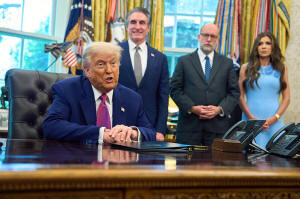Trump's plan to begin 'phasing out' FEMA after hurricane season burdens
states, experts warn
[June 12, 2025]
By GABRIELA AOUN ANGUEIRA
SAN DIEGO (AP) — President Donald Trump's plan to begin “phasing out”
the federal agency that responds to disasters after the 2025 hurricane
season is likely to put more responsibilities on states to provide
services following increasingly frequent and expensive climate
disasters, experts said.
“We want to wean off of FEMA and we want to bring it down to the state
level,” Trump said Tuesday in an Oval Office appearance with
administration officials about preparations for summer wildfires.
Trump and Homeland Security Secretary Kristi Noem have repeatedly
signaled their desire to overhaul, if not completely eliminate, the
46-year-old Federal Emergency Management Agency. While there has been
bipartisan support for reforming the agency, experts say dismantling it
completely would leave gaps in crucial services and funding.
“It just causes more concern on how states should be planning for the
future if the federal government’s not going to be there for them,” said
Michael Coen, FEMA chief of staff during the Obama and Biden
administrations.
Disaster response is already locally led and state-managed, but FEMA
supports by coordinating resources from federal agencies, providing
direct assistance programs for households and moving money to states for
repairing public infrastructure.
Trump said Tuesday he wants to “give out less money,” and to “give it
out directly,” sidestepping FEMA programs. He said he did not know who
would distribute the funds, saying they could come “from the president’s
office” or DHS.
“I was left with the impression that he doesn't really understand the
scale of what FEMA manages on a yearly basis with a budget of over $30
billion,” said Coen.
Dismantling FEMA, or even changing how much of the costs it shares with
states in the event of a major disaster declaration, would require
action from Congress, including amending the 1988 Stafford Act, which
outlines FEMA's roles and responsibilities and the cost share between
the feds and the states.

Declaring fewer major disasters or giving less federal support could put
an untenable financial burden on states, said Sara McTarnaghan,
principal research associate at the Urban Institute.
“Very few of them would have had enough funds set aside to anticipate
the federal government stepping back from its historic role in disaster
recovery for major events,” McTarnaghan said.
A recent Urban Institute analysis found that between 2008-2024,
quadrupling the economic threshold of when major disasters are declared
would have shifted $41 billion in public assistance costs alone to state
and local governments.
“I think the trade off for states and communities is going to be, do we
accept a less full recovery or do states draw on other resources to meet
these goals and needs, perhaps at the cost of investments in other kinds
of social programs or functions of the state,” said McTarnaghan.
[to top of second column]
|

President Donald Trump speaks with reporters in the Oval Office of
the the White House, Tuesday, June 10, 2025, in Washington, as from
left, Interior Secretary Doug Burgum, Office of Management and
Budget Director Russell Vought, and Homeland Security Secretary
Kristi Noem, listen. (AP Photo/Evan Vucci)

Not all states will be able to generate much more revenue, she
added.
“The confluence of states that have really high disaster exposure
and states that have relatively limited fiscal capacity are
overlapping in many ways,” she said. “That’s the case for a lot of
states along the Gulf Coast that we’re concerned about going into
hurricane season but also the case for some Midwestern states that
face issues with severe convective storms.”
Trump dismissed the idea that states can’t handle the bulk of
disasters on their own.
“The governor should be able to handle it and frankly if they can’t
handle the aftermath, then maybe they shouldn’t be governor,” he
said.
He suggested that some of the gaps could be filled by more
collaboration among states. Noem said FEMA is building communication
and mutual aid agreements among states “to respond to each other so
that they can stand on their own two feet.”
A national mutual-aid structure called the Emergency Management
Assistance Compact already exists, but its operations are typically
reimbursed by the federal government, said Coen. “There's already
robust communication between states. The confusion is what they can
expect from the federal government.”
Regarding the current hurricane season, which began June 1, Noem
said FEMA “stands prepared.” But there have already been changes to
how the agency operates. It suspended its door-to-door canvassing
program that helped enroll survivors for assistance. More than 2,000
FEMA staff, around one-third of the full-time workforce, have left
or been fired since January.
After severe weather this spring, some states waited as long as
eight weeks for approval on their disaster declaration requests, and
several requests are still pending. Trump has not approved any
requests for hazard mitigation assistance since February, a typical
add-on to individual and public assistance that helps states build
back in more resilient ways.
A FEMA review council established by Trump and co-chaired by Noem
and Defense Secretary Pete Hegseth will submit suggestions for
reforms in the next few months, according to Noem.
In its first meeting in May, Noem told the group of governors,
emergency managers, and other officials primarily from Republican
states that Trump is seeking drastic change.
“I don't want you to go into this thinking we're going to make a
little tweak here,” she said. “No, FEMA should no longer exist as it
is.”
All contents © copyright 2025 Associated Press. All rights reserved |